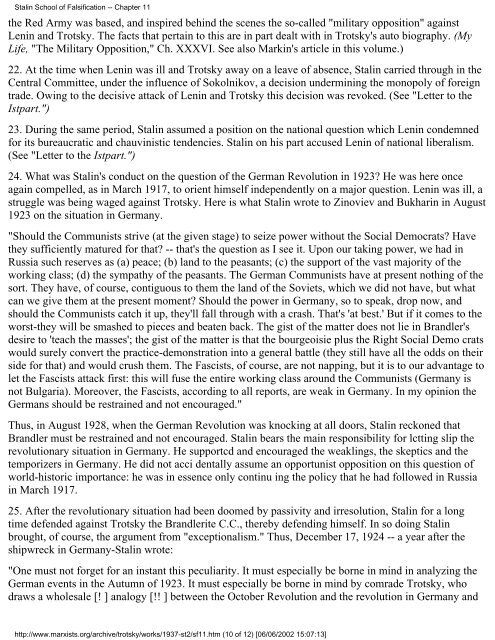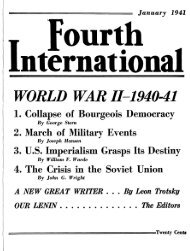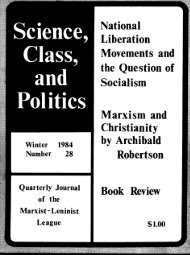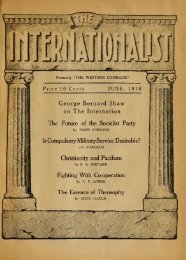The Stalin school of falsification - Marxists Internet Archive
The Stalin school of falsification - Marxists Internet Archive
The Stalin school of falsification - Marxists Internet Archive
Create successful ePaper yourself
Turn your PDF publications into a flip-book with our unique Google optimized e-Paper software.
<strong>Stalin</strong> School <strong>of</strong> Falsification -- Chapter 11<br />
the Red Army was based, and inspired behind the scenes the so-called "military opposition" against<br />
Lenin and Trotsky. <strong>The</strong> facts that pertain to this are in part dealt with in Trotsky's auto biography. (My<br />
Life, "<strong>The</strong> Military Opposition," Ch. XXXVI. See also Markin's article in this volume.)<br />
22. At the time when Lenin was ill and Trotsky away on a leave <strong>of</strong> absence, <strong>Stalin</strong> carried through in the<br />
Central Committee, under the influence <strong>of</strong> Sokolnikov, a decision undermining the monopoly <strong>of</strong> foreign<br />
trade. Owing to the decisive attack <strong>of</strong> Lenin and Trotsky this decision was revoked. (See "Letter to the<br />
Istpart.")<br />
23. During the same period, <strong>Stalin</strong> assumed a position on the national question which Lenin condemned<br />
for its bureaucratic and chauvinistic tendencies. <strong>Stalin</strong> on his part accused Lenin <strong>of</strong> national liberalism.<br />
(See "Letter to the Istpart.")<br />
24. What was <strong>Stalin</strong>'s conduct on the question <strong>of</strong> the German Revolution in 1923? He was here once<br />
again compelled, as in March 1917, to orient himself independently on a major question. Lenin was ill, a<br />
struggle was being waged against Trotsky. Here is what <strong>Stalin</strong> wrote to Zinoviev and Bukharin in August<br />
1923 on the situation in Germany.<br />
"Should the Communists strive (at the given stage) to seize power without the Social Democrats? Have<br />
they sufficiently matured for that? -- that's the question as I see it. Upon our taking power, we had in<br />
Russia such reserves as (a) peace; (b) land to the peasants; (c) the support <strong>of</strong> the vast majority <strong>of</strong> the<br />
working class; (d) the sympathy <strong>of</strong> the peasants. <strong>The</strong> German Communists have at present nothing <strong>of</strong> the<br />
sort. <strong>The</strong>y have, <strong>of</strong> course, contiguous to them the land <strong>of</strong> the Soviets, which we did not have, but what<br />
can we give them at the present moment? Should the power in Germany, so to speak, drop now, and<br />
should the Communists catch it up, they'll fall through with a crash. That's 'at best.' But if it comes to the<br />
worst-they will be smashed to pieces and beaten back. <strong>The</strong> gist <strong>of</strong> the matter does not lie in Brandler's<br />
desire to 'teach the masses'; the gist <strong>of</strong> the matter is that the bourgeoisie plus the Right Social Demo crats<br />
would surely convert the practice-demonstration into a general battle (they still have all the odds on their<br />
side for that) and would crush them. <strong>The</strong> Fascists, <strong>of</strong> course, are not napping, but it is to our advantage to<br />
let the Fascists attack first: this will fuse the entire working class around the Communists (Germany is<br />
not Bulgaria). Moreover, the Fascists, according to all reports, are weak in Germany. In my opinion the<br />
Germans should be restrained and not encouraged."<br />
Thus, in August 1928, when the German Revolution was knocking at all doors, <strong>Stalin</strong> reckoned that<br />
Brandler must be restrained and not encouraged. <strong>Stalin</strong> bears the main responsibility for lctting slip the<br />
revolutionary situation in Germany. He supportcd and encouraged the weaklings, the skeptics and the<br />
temporizers in Germany. He did not acci dentally assume an opportunist opposition on this question <strong>of</strong><br />
world-historic importance: he was in essence only continu ing the policy that he had followed in Russia<br />
in March 1917.<br />
25. After the revolutionary situation had been doomed by passivity and irresolution, <strong>Stalin</strong> for a long<br />
time defended against Trotsky the Brandlerite C.C., thereby defending himself. In so doing <strong>Stalin</strong><br />
brought, <strong>of</strong> course, the argument from "exceptionalism." Thus, December 17, 1924 -- a year after the<br />
shipwreck in Germany-<strong>Stalin</strong> wrote:<br />
"One must not forget for an instant this peculiarity. It must especially be borne in mind in analyzing the<br />
German events in the Autumn <strong>of</strong> 1923. It must especially be borne in mind by comrade Trotsky, who<br />
draws a wholesale [! ] analogy [!! ] between the October Revolution and the revolution in Germany and<br />
http://www.marxists.org/archive/trotsky/works/1937-st2/sf11.htm (10 <strong>of</strong> 12) [06/06/2002 15:07:13]

















